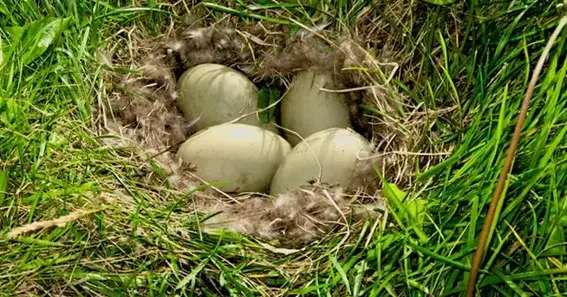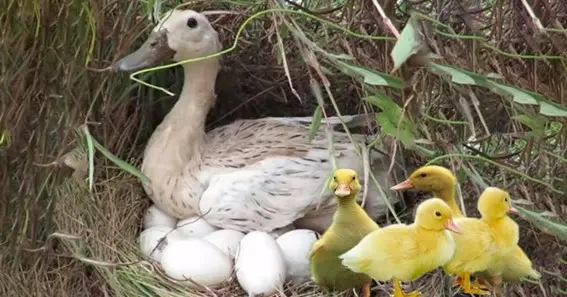How often do ducks lay eggs? Ducks typically lay one to two eggs per day during the spring breeding season. Watching ducks, you may wonder how they lay eggs and how sophisticated their sexual procedures are. Ducks are fascinating creatures that lay eggs and create nests. Knowing how often ducks lay eggs helps you understand their life cycles and breeding care. In this article we discuss about how often do ducks lay eggs and more about it.
How often do ducks lay eggs?
Ducks typically lay one to two eggs per day during the spring breeding season. This is crucial to understanding how these birds breed. Ducks lay eggs once a year, generally in April. Female ducks (hens) deposit eggs uniquely and recurringly during this period.
A hen will lay one to two eggs daily until she has all her chicks. A clutch might take 7-10 days to install. After the clutch is complete, the hen warms the eggs. The hen spends most of the 28-day hatching period in the nest. She waits for her partner to feed her. If you locate a duck nest containing eggs, the hen may leave briefly if she feels threatened. Domestic ducks commonly lay one egg nearly every day during their breeding season, though the exact frequency varies by breed and conditions.
The Frequency of Duck Egg Laying

Know how often do ducks lay eggs help explain reproduction and maintain nests. When ready to procreate, ducks deposit eggs in spring. Daily, females lay one to two eggs until they finish their clutch. From choosing a nest site to hatching, this process is fascinating. Knowing these facts will help you respect duck habits and protect their health if you’re near a nest.
Breeding time
Ducks breed in spring, but the date varies by location and kind. This season runs from March to June in moderate climates. The breeding season begins with warmer temperatures and more sunlight, and duck hormones alter. Their reproductive capabilities depend on this period because it’s optimum for egg-laying and raising young. Spring brings higher mating activity for male and female ducks and a fresh breeding cycle begins.
Nesting conduct
Duck ladies pick nesting sites carefully. They deposit their eggs in peaceful, isolated areas to protect them from predators and weather. Birds nest among dense vegetation, long grasses, and reeds near water. Ducks make ground nests and line them with down feathers to keep their eggs warm. The nesting site protects the eggs from predators and severe weather.
Eggs deposited
Ducks reproduce by laying a certain number of eggs daily. The female duck lays one to two eggs daily. This rate depends on the duck’s age, health, and environment. Chickens lay eggs until they finish their clutch, usually 12 eggs. Individual species may have various numbers. Due to selective breeding and superior living conditions, domestic ducks may lay more eggs than wild ducks.
Incubation Time
After laying all her eggs, the hen incubates. About 28 days pass before duck eggs hatch. The hen remains in the nest to warm the eggs. Sometimes, she leaves the nest to eat briefly. The male duck might feed the hen during this crucial period. The hen’s dedication to holding the eggs at the optimum temperature and humidity ensures their hatching.
Short-term absences
If you already read how often do ducks lay eggs, you must know a hen may abandon the nest temporarily. Moving the nest or the hen going to collect food might cause this. The hen may return if you find an empty duck nest containing eggs. Ducks protect their offspring and won’t leave the eggs simply because they’re gone. Avoid disturbing the nest so the hen may lay eggs again.
Clutch Size
Type, age, and environment affect a duck’s nest egg count. Most species lay 12 eggs per clutch, although some lay more. Mallards, a famous duck, usually lay 8–13 eggs. The hen’s health and resources impact her egg production. A larger clutch size increases the likelihood of some eggs hatching, as not all eggs hatch.
Egg-related things
Duck eggs differ from chicken eggs in various ways. The thicker shell and larger size protect the expanding egg. Ducks lay white, blue, and green eggs. Duck eggs survive longer than chicken eggs due to their more rigid shells. Ducks may need to keep their eggs for an extended period before hatching; therefore, this characteristic is essential.
Pregnancy health
A duck’s egg-laying potential relies on her diet. Well-fed ducks lay better eggs. Diet, stress, and health affect her fertility. A diversified diet with all the nutrients ducks require keeps them healthy and makes it simpler for them to lay and hatch eggs. The hen and her brood need proper care throughout the breeding season to be healthy.

Conclusion
Know how often ducks lay eggs to understand how they reproduce and how to care for them during the breeding season. A duck’s clutch has 12 eggs when it lays one to two eggs daily in spring. The hen remains in the nest and lives on her partner for 28 days throughout hatching. Please do not disturb a duck nest in your garden. If you don’t, the hen will care for her eggs. Duck populations and fascinating life cycles can survive if we respect how they construct their nests and safeguard their habitats. In above we discuss about how often do ducks lay eggs and explore more about it.
FAQ
How often do ducks lay eggs?
Ducks deposit eggs only once a year in spring, during breeding season. They lay one to two eggs daily until the clutch is full.
Duck clutches have how many eggs?
Ducks usually lay 12 eggs per clutch. The number varies by species, age, and environment.
How should I handle an egg-filled duck nest?
Don’t disturb duck nests. After leaving, the hen will return if no one damages the nest.
How long do ducks warm their young?
Duck eggs stay warm for 28 days. The hen stays in the nest to keep the eggs warm and eats from her partner.
What affects duck egg-laying capabilities?
A duck’s health, diet, and environment affect her egg-laying potential. Hatching and egg production require proper diet and care.
Sources:








